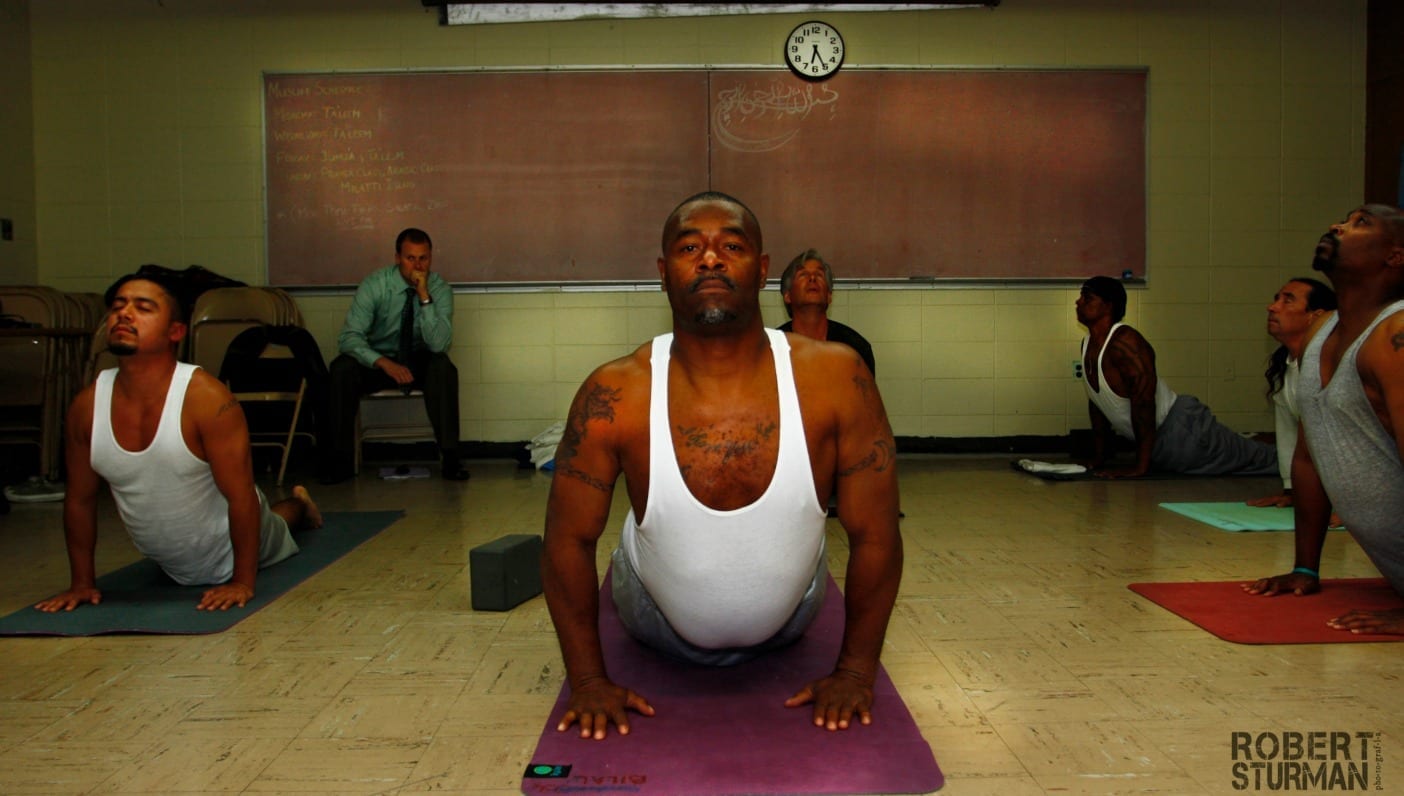
In prisons around the U.S., yoga and mindfulness practices are becoming a widely used tool to help inmates cope with their circumstances. And even in Britain, meditation is now being used as a technique to help calm some of the country’s most dangerous criminals.
A new study by Washington State University found that prison yoga programs helped develop more empathy among male inmates. The results, published in a recent edition of the Californian Journal of Health Promotion, showed a direct correlation between a regular yoga practice and improved parenting skills.
Over the course of three years at Chelan County Regional Jail in Wenatchee, WA, 14 different groups of male inmates were studied. The program,“Fit Fathers, Successful Families, Inside & Out,” was designed to help prevent future child abuse, and improve the inmate’s resilience to avoid behavioral relapse. Given the myriad health and healing benefits of yoga, WSU Extension Educator Jennifer Crawford conducted the research to test whether or not the practice could also help the inmates become better fathers.
Read more from the Washington State University News:
“Yoga can be physically demanding, and the initial responses we got from the participants confirmed that,” Crawford said. “I believe the yoga practice helped participants become ready to learn and increased their willingness to try new ideas, absorb new information and begin to apply these in their lives.”
Although the yoga instructor for each lesson couldn’t physically touch the participants due to jail regulations, Crawford said the classes didn’t look that unusual. “It was very similar to what a person would see in a normal yoga gym—other than the security guards entering and leaving the room,” she said.
The instructor started every class with a centering exercise, then taught simple sequences that focused on standing poses; more complicated poses were not used due to potential health issues among the inmates. Outside of the class setting, the inmates did journaling exercises such as writing about their own upbringing or ways they communicate with their children.
So what could this mean for all the dads out there who have not been incarcerated? Since yoga and meditation have been proven to show more empathy in practitioners, whether or not a man (or even a woman for that matter) has a violent, criminal past, it’s not a far stretch to think they’d likely perform better as a parent, too. If mindfulness is a practice of turning inward, in order to step outside of ourselves and view the world with more compassion, this could have a direct effect on how we raise our children.
Data News & Analysis India offers some perspective:
The results showed that inmates demonstrated being more aware and accepting of their vulnerability and responsiveness to children, among other benefits.
“Yoga can be physically demanding, and the initial responses we got from the participants confirmed that,” Crawford said. “I believe the yoga practice helped participants become ready to learn and increased their willingness to try new ideas, absorb new information and begin to apply these in their lives,” she said.
The proof is in the practice. And a dedicated, regular yoga (and meditation) practice can make all of us (and not just those convicted) better humans and yes, better, more mindful parents. Everybody wins. Because it’s when we can come to truly love ourselves first, that it becomes much simpler to love the world around us and everyone in it.
Photo courtesy of Robert Sturman Studio for the Prison Yoga Project
–
 Andrea Rice is the Practice and Community Editor for Wanderlust Media. She is also a writer and yoga teacher. Her work has appeared in The New York Times, Yoga Journal, mindbodygreen, Yoganonymous, AstroStyle, and several music magazines. Her teaching style is a blend of her love for music and intuitive movement, with emphasis on core strength. You can find her regular classes at Shambhala Yoga in Brooklyn and connect with her on Instagram and Twitter.
Andrea Rice is the Practice and Community Editor for Wanderlust Media. She is also a writer and yoga teacher. Her work has appeared in The New York Times, Yoga Journal, mindbodygreen, Yoganonymous, AstroStyle, and several music magazines. Her teaching style is a blend of her love for music and intuitive movement, with emphasis on core strength. You can find her regular classes at Shambhala Yoga in Brooklyn and connect with her on Instagram and Twitter.